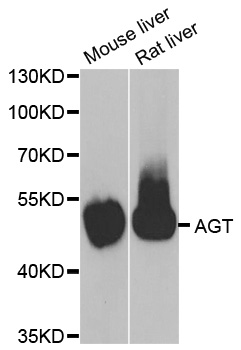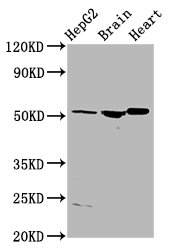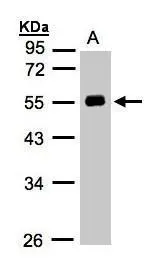Angiotensin I/II/III antibody [B938M]
GTX44411
ApplicationsELISA
Product group Antibodies
ReactivityHuman
TargetAGT
Overview
- SupplierGeneTex
- Product NameAngiotensin I/II/III antibody [B938M]
- Delivery Days Customer9
- Application Supplier NoteELISA: 1:10-1:100. *Optimal dilutions/concentrations should be determined by the researcher.Not tested in other applications.
- ApplicationsELISA
- CertificationResearch Use Only
- ClonalityMonoclonal
- Clone IDB938M
- Concentration1 mg/ml
- ConjugateUnconjugated
- Gene ID183
- Target nameAGT
- Target descriptionangiotensinogen
- Target synonymsANHU, SERPINA8, hFLT1, angiotensinogen, alpha-1 antiproteinase, antitrypsin, angiotensin I, angiotensin II, fetal-liver predominant transporter 1, pre-angiotensinogen, serine (or cysteine) proteinase inhibitor, serpin A8, serpin peptidase inhibitor, clade A, member 8
- HostMouse
- IsotypeIgG1
- Protein IDP01019
- Protein NameAngiotensinogen
- Scientific DescriptionThe protein encoded by this gene, pre-angiotensinogen or angiotensinogen precursor, is expressed in the liver and is cleaved by the enzyme renin in response to lowered blood pressure. The resulting product, angiotensin I, is then cleaved by angiotensin converting enzyme (ACE) to generate the physiologically active enzyme angiotensin II. The protein is involved in maintaining blood pressure and in the pathogenesis of essential hypertension and preeclampsia. Mutations in this gene are associated with susceptibility to essential hypertension, and can cause renal tubular dysgenesis, a severe disorder of renal tubular development. Defects in this gene have also been associated with non-familial structural atrial fibrillation, and inflammatory bowel disease. [provided by RefSeq, Jul 2008]
- ReactivityHuman
- Storage Instruction-20°C or -80°C,2°C to 8°C
- UNSPSC41116161
References
- Severe COVID-19 induces autoantibodies against angiotensin II that correlate with blood pressure dysregulation and disease severity.Read this paper







![WB analysis of human plasma using GTX83369 Angiotensinogen antibody [1B1].](https://www.genetex.com/upload/website/prouct_img/normal/GTX83369/GTX83369_20170912_WB_w_23061322_445.webp)